Cross River superhighway changes course in Nigeria
The Cross River state government in southeastern Nigeria has agreed to reroute a 260-kilometer superhighway project in response to concerns that its construction would threaten wildlife and local communities.
- The 260-kilometer (162-mile) highway is slated to have six lanes and would have run through the center of Cross River National Park as originally designed.
- The region is a biodiversity hotspot and home to forest elephants, drills, Nigeria-Cameroon chimpanzees and Cross River gorillas.
- The proposal shifts the route to the west, out of the center of the national park, which garnered praise from the Wildlife Conservation Society.
- The route still appears to cut through forested areas and protected lands.
The path of a major highway project in eastern Nigeria has been altered in response to concerns from local and international groups about its impact on wildlife and communities.
The Wildlife Conservation Society (WCS), based at the Bronx Zoo in New York City, immediately celebrated the shift.
“We did it,” said John Calvelli, the organization’s executive vice president for public affairs, in a statement. “The superhighway has been rerouted and wildlife saved.”
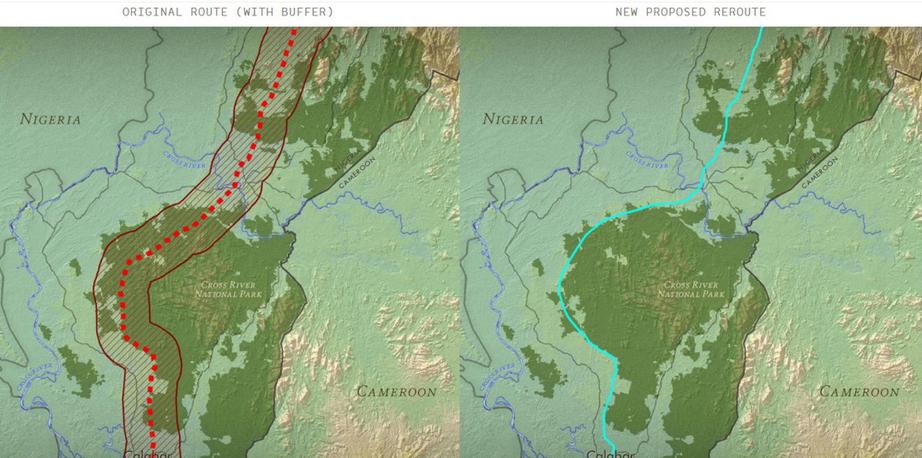
The original (left) and rerouted (right) Cross River highway project and Cross River National Park in southeastern Nigeria. Map courtesy of WCS.
WCS and other NGOs and scientific organizations have campaigned against the construction of a six-lane, 260-kilometer (162-mile) Cross River Highway because it cut through Nigeria’s Cross River National Park, which provides important habitat for wildlife, including IUCN Red List species and subspecies such as forest elephants (Loxodonta cyclotis), drills (Mandrillus leucophaeus) and Nigeria-Cameroon chimpanzees (Pan troglodytes ellioti). Identified as a biodiversity hotspot, the park also serves as the one of the last refuges for the roughly 300 remaining Cross River gorilla (Gorilla gorilla diehli).
The new highway route has been moved to the fringes of the national park, according to a map produced by WCS.
“The original route for the 160-mile superhighway, which included a 12-mile-wide buffer, would have been catastrophic for the Cross River rainforest, demolishing some of the last-remaining habitat of the highly endangered Cross River gorilla,” Calvelli said in the statement.
Officials reduced the buffer to 140 meters (459 feet) in February.
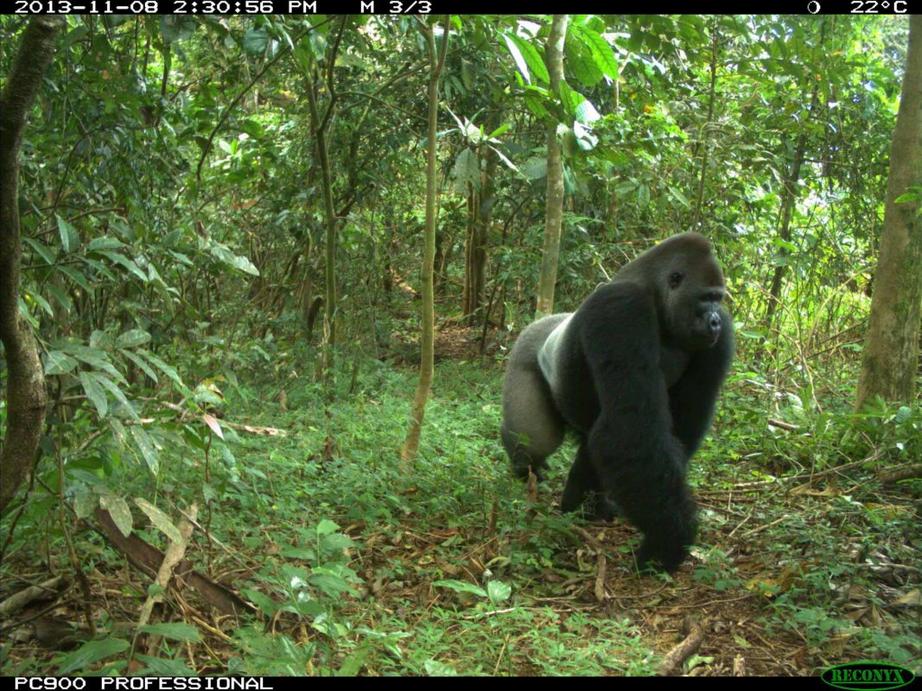
A camera trap photo of a Cross River gorilla. Photo courtesy of WCS-Nigeria.
Bill Laurance, a tropical ecologist at James Cook University in Cairns, Australia, studies the impacts of roads on the environment and is one of the lead authors on a paper currently in press at the journal Tropical Conservation Science that outlines two alternative routes for this specific highway.
Of this latest development in the Cross River project, Laurance said, “The proposed route certainly seems to be better than the original proposal.”
But construction of the road along the new path doesn’t appear to be a perfect solution, he added.
“To my eye, the proposed reroute still appears to be cutting through significant areas of forest and protected area,” he said in an interview. “I’m withholding judgment until I see this in more detail, but I still have some concerns.”
Ben Ayade, the governor of Cross River state, has championed the project since taking office in May 2015 as a boon for the state’s economy. Sources say the road is expected to cost up to several billion dollars to complete, though the price tag could be as little as $1 billion. No estimates have been made public about how the changes to the route could affect those figures.
Ayade’s office did not respond to requests through multiple channels for comment.
“We need to open the horizon to get teeming young people employed,” he said in a speech in 2015. The road is designed to link the port of Calabar on the Gulf of Guinea with the landlocked Cross River city of Ikom, and with Katsina Ala in Benue state. That paved highway would trim the travel time between Katsina Ala and Calabar to 90 minutes from 5 to 6 hours, Ayade told the crowd.
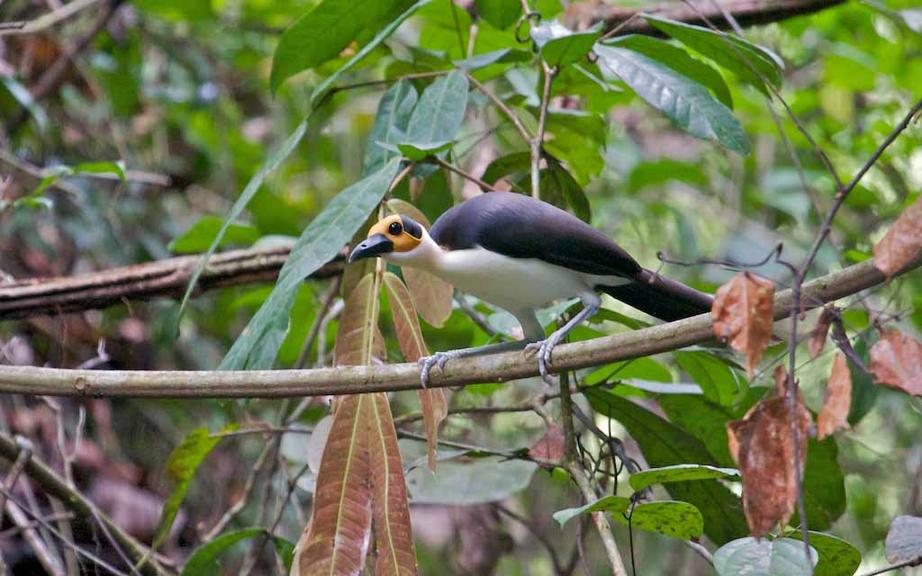
A white-necked rock fowl in Cross River National Park. Photo by Michael Anderson.
The influx of people in connection with the road construction worried conservationists and human rights advocates alike.
If the road had gone in along the originally proposed route, “You can be sure that the entire forest will be gone in no time,” said Odey Oyama, executive director of the Rainforest Resource and Development Centre, a Cross River-based NGO, in a 2015 interview.
The Ekuri Initiative, an indigenous organization that focuses on forest stewardship, collected 253,000 signatures from people opposing the project on the grounds that it threatened local rights to the land. The communities of Old Ekuri and New Ekuri, which jointly manage a 33,600-hectare (about 83,000-acre) forest in the buffer zone of the national park, characterized the highway “a land grab in the guise of a Super Highway” because of the amount of land that the government had taken over for the project. The initiative’s leaders delivered the petition to the Nigerian federal government in 2016.
President Muhammadu Buhari, who was elected in 2015, initially seemed supportive of the project, but he cancelled a visit to a September 2015 groundbreaking ceremony when he found out that an environmental impact assessment for the project had not been filed.
“The President’s reaction is a very strong signal to remind everyone that the law cannot be taken for granted,” said Nnimmo Bassey, the director of the environmental think tank Health of Mother Earth Foundation in Benin City, Nigeria, in a 2015 interview.
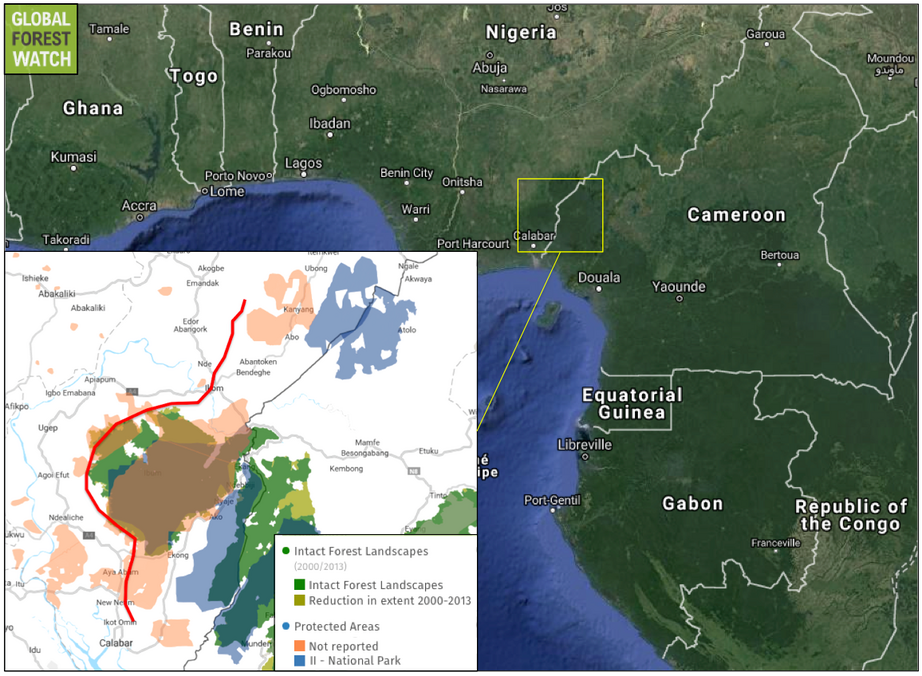
Data visualized on Global Forest Watch show the newly altered route proposal for the Cross River highway (red) will still cut through intact forest and protected areas in southeastern Nigeria. Map courtesy of Global Forest Watch.
Now, the Ayade administration is garnering praise for his government’s role in changing the path of the highway.
“The proposed route will ensure that the nation’s incredible biodiversity is safeguarded,” said Calvelli. “We thank the government for listening to the local Ekuri Community and other communities’ voices who have expressed concern over the proposed highway’s impacts to lands important to people.”
Calvelli also highlighted the need for continued participation as the road is built.
“We urge the public to stay engaged on this issue as it continues to develop,” he said. “Together, we can do what’s right for Nigeria’s wildlife and the communities that depend on healthy forests and strong protected areas.”
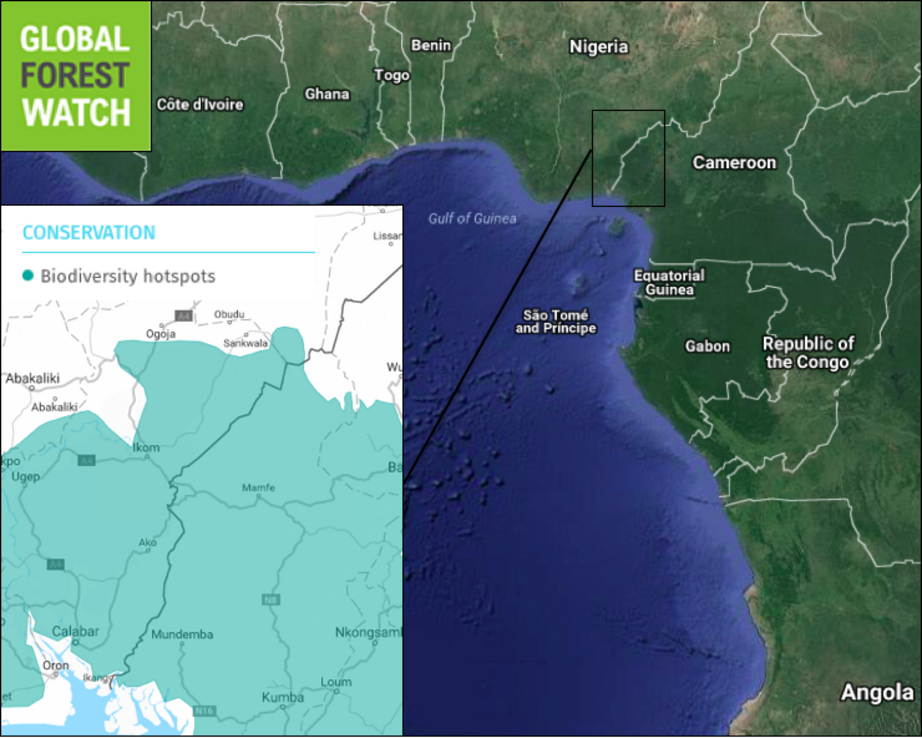
Much of the area between Ikom and Calabar, the two Cross River state cities the highway will connect, is a biodiversity hotspot. Map courtesy of Global Forest Watch.

